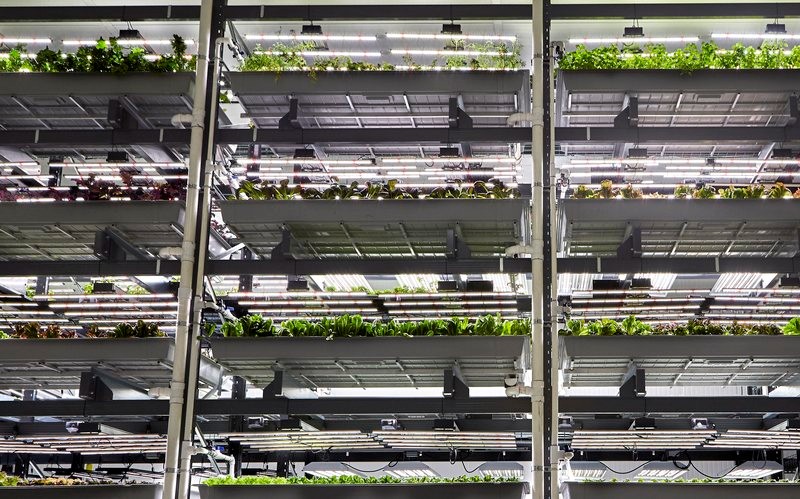初创公司Bowery打造全球科技含量最高的室内农场

|
室内垂直种植初创企业Bowery正在建设自己的第二个室内农场——公司称它将是世界上技术最领先的室内农场。 这座室内农场位于美国新泽西州的科尼市,比附近的室内农场的产量高30倍,为全食(Whole Food)和觅食者(Foragers)等企业客户提供100种绿叶蔬菜。 去年5月,总部位于纽约的这家初创公司获得2000万美元的A轮融资,来自General Catalyst、GGV、GV(更名前为谷歌风投)等风投公司的这笔资金用于建造新的农场。 Bowery将机器人技术、机器学习技术、预测分析技术运用到农业上,要知道,在各种行业里,农业向来是对新的技术进步和数字化技术比较慢热的那一个。 Bowery开发出一款具有强大感应器网络的独家软件系统,可以实时获得数据,从而预先了解农作物的品质、质地、颜色、产量等结果。“这个软件系统就是农场的大脑,”Bowery公司的CEO兼创始人艾文·费恩说。 借助数据输入对水流、光照、温度、适度等因素做出小的调整,就能改变食材的口感和风味——比如说,让芥菜的香味儿更浓郁一点儿。 “利用我们的系统可以自动实现这些变化,具有无与伦比的精确度和控制度。”费恩说。 费恩称,与一平方英尺的农田相比,Bowery的产出效率要高100倍还多,一个主要原因是公司一年365天都能种植植物,在这个全面控制的环境中,农业种植完全不受季节影响。而且Bowery不使用任何杀虫剂和农药。如果在普通农田里这样做,势必使产量大大降低,然而Bowery每年有更多的种植季,植物生长速度比普通农田快一倍,每个生长季的产量也更高,费恩说。 Bowery的模式预计将满足人们对本地食材日益增长的需求。该农场位于新泽西州,生产的食材将销往新泽西州,以及临近的康涅狄格州及纽约州。“我们发现,对于本地出产优质农产品,无论在美国还是其它国家都有很强的需求。”费恩说。 由于农作物的产地与消费地点较近,“减少了我们与消费者之间的中间流程。”由于效率提高了,成本也就降低了,费恩解释道。 美国国家有机标准委员会最近针对水培方法种植的食材——也就是无土化种植的植物——是否可以被认证为有机植物进行了投票。尽管投票结果为“是”,费恩说Bowery并不卷入这样的讨论,也不把精力放在有机认证上。 “我们种植的是后有机作物,这是更进一步的进化。”费恩解释说,有机作物并不禁用杀虫剂,在他的农场却是不允许使用的。 “垂直农业产出更好的食材,是更好的种植方式,对地球的破坏更小。我们借助垂直农业技术提供最纯粹的食物。”费恩说。(财富中文网) 译者:珠珠 |
Indoor vertical farming startup Bowery is in the process of building a second facility which it claims will be the most technologically sophisticated indoor farm in the world. The operation will be in Kearny, N.J., and grow 30 times more produce than its current indoor farm that’s located nearby, and supply 100 types of leafy greens and herbs for customers like Whole Foods and Foragers. In May, the New York City-based startup raised a $20 million Series A from investors including General Catalyst, GGV, and GV (formerly Google Ventures), with capital from the round going toward building the new farm. Bowery is applying robotics, machine learning, and predictive analytics to the agriculture sector, a segment of the economy that has been slow to adopt technology and digital advancements. The company has developed what is says is a proprietary software system, complete with a robust network of sensors that takes in data in real time to determine outcomes like the quality, texture, color, and yield of its plants. “The software is the brains of the farm,” says Bowery CEO and founder Irving Fain. Small adjustments—water flow, light intensity, temperature, humidity—can then be made in response to data inputs to impact outcomes like taste and flavor, such as growing a mustard green that’s got a spicier pick. “These changes get pushed out automatically into our system,” says Fain. “The precision and level of control is unparalleled.” Fain says that Bowery is more than 100 times more efficient than a square foot of farmland, in large part because the startup can grow 365 days a year independent of season in a completely controlled environment. Bowery doesn’t use any pesticides or agri-chemicals. Normally out in a field that would lead to reduction in yield, but Bowery has more crop cycles per year, grows twice as fast as a field, and has higher yield per crop cycle, says Fain. The Bowery model is also predicated on a growing demand for local food. Since the farm is located in New Jersey, its produce goes out to the tri-state area. “We see very strong demand nationally and internationally right now for high quality locally produced consistent produce,” Fain says. Because the produce is grown close to the point of consumption, “not as many players sit between us and the final consumers.” That level of efficiency helps keep costs down, Fain explains. The National Organic Standards Board recently voted on whether hydroponics—essentially crops not grown in soil—could be certified as organic. While the board voted yes, Fain says that Bowery wasn’t involved in those conversations and isn’t focused on the organic certification. “We’re growing post-organic produce,” he says. “It’s the next evolution.” Organic, he explains, still allows for pesticides—something his operation does not use “It’s a better product for us and better way of growing and less destructive to the earth,” says Fain. “We’re using technology to grow the purest food possible.” |













